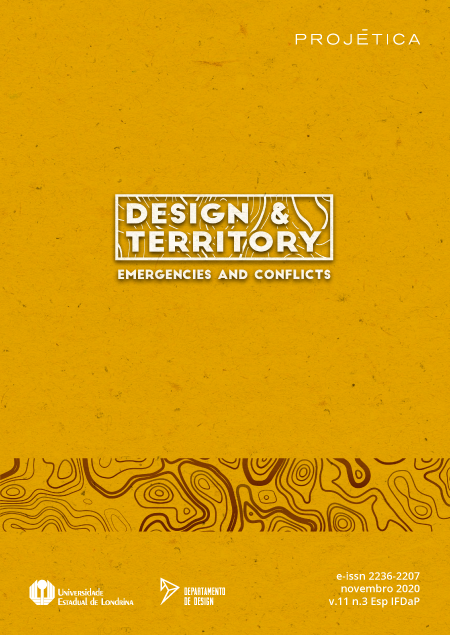Design, social innovation and peace: experiences from the Amazon-Orinoquía border in Colombia (2018-2019)
DOI:
https://doi.org/10.5433/2236-2207.2020v11n3esp.p109Keywords:
Social Design, Social Innovation, Peace, Agro Ecology, ColombiaAbstract
As a contribution to the implementation of the Peace Agreements in Colombia, an accompaniment initiative has been developed from the discipline of industrial design for the promotion of productive and social projects, aimed at supporting the process of reinstatement of former combatants of the FARC EP guerrilla in the department of Guaviare. The objective is to support the construction of Peace from the design activity as a strategic element in social development through innovation dynamics and strengthening productive processes of grassroots economy, articulating the dynamics and interests of communities and government institutions in the local development. The methodology used was the Co-design process among teams of students, FARC EP ex-combatants and community members in order to formulate and develop productive projects and social development linked to the Territorial Training and Reincorporation Space Jaime Pardo Leal (“Espacio Territorial de Capacitación y Reincorporación Jaime Pardo Leal” in Spanish), in the village of Colinas, municipality of San José del Guaviare - Colombia. As a result the group have been working on five projects: agro ecology, production of capsicum jam, tourism, dairy and education and culture, all of them aimed at strengthening productive and social development initiatives. In this way this experience has allowed students to open up a dimension of how relevant the design in the social field can be, identifying problems and opportunities for contribution from design to local development. All pointing at overcoming the causes of armed conflict and contributing to a stable and lasting peace through a process of dialogue with the knowledge of former combatants and communities.Downloads
References
ECHEVERRÍA EZPONDA, Javier; MERINO MALILLOS, Lucía. Cambio de paradigma en los estudios de innovación: el giro social de las políticas europeas de innovación. ARBOR Ciencia, Pensamiento y Cultura, v. 187, n. 752, 2011. Doi:10.3989/arbor.2011.752n6002. Available on: http://arbor. revistas.csic.es/index.php/arbor/article/view/1387/1396. Access in: 4 Feb. 2020.
ECHEVERRÍA, Javier. El manual de Oslo y la innovación social. ARBOR Ciencia, Pensamiento y Cultura, v. 184, n. 732, p. 609-618, 2008. ISSN: 0210- 1963. Available on: http://arbor.revistas.csic.es/index.php/arbor/article/ view/210/211. Access in: 9 Jan. 2020.
ESCOBAR, Arturo. Autonomía y diseño. La realización de lo comunal. Colombia: Editorial Universidad de Cauca, 2015.
MANZINI, Ezio. Cuando todos diseñan: una introducción al diseño para la innovación social. Madrid, España: Experimenta Editorial, 2015.
MARGOLÍN, Victor. Construir un mundo mejor: diseño y responsabilidad social. Ciudad de México: Editorial Designio, 2016.
PAPANEK, Victor. Diseñar para el mundo real. Ecología humana y cambio social. Barcelona: Pollen Ediciones, 2014. Available on: http://pol-len.cat/wpcontent/uploads/2014/11/Disenarparaelmundoreal.pdf. Access in: 9 Mar. 2020.
REY DE MARULANDA, Nohra; TANCREDI, Francisco. De la innovación social a la política pública: historias de éxito en América Latina y el Caribe. Santiago de Chile: CEPAL, 2010. Available on: http://repositorio.cepal.org/bitstream/ handle/11362/39313/LCW351_es.pdf?sequence=1. Access in: 9 Mar. 2020.
Downloads
Published
How to Cite
Issue
Section
License
Projética está licenciada sob a Creative Commons Attribution CC-BY 4.0 International. Os autores detém os direitos autorais e concedem à revista o direito de exclusividade de primeira publicação.
Os autores dos trabalhos aprovados autorizam Projética a, após a publicação, ceder seu conteúdo para reprodução em indexadores de conteúdo, bibliotecas virtuais e similares.
Os autores assumem que os textos submetidos à publicação são de sua criação original, responsabilizando-se inteiramente por seu conteúdo em caso de eventual impugnação por parte de terceiros. As opiniões emitidas pelos autores dos artigos são de sua exclusiva responsabilidade.
A revista se reserva o direito de efetuar, nos originais, alterações de ordem normativa, ortográfica e gramatical, com vistas a manter o padrão culto da língua e a credibilidade do veículo. Respeitará, no entanto, o estilo de escrever dos autores. Alterações, correções ou sugestões de ordem conceitual serão encaminhadas aos autores, quando necessário. Nesses casos, os artigos, depois de adequados, deverão ser submetidos a nova apreciação. As provas finais não serão encaminhadas aos autores.











